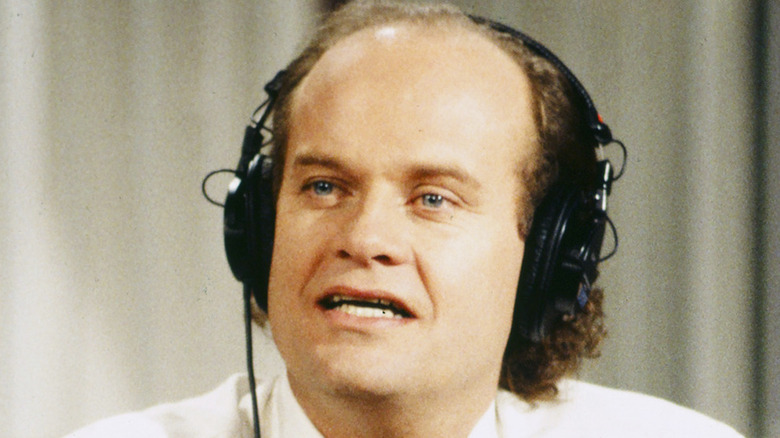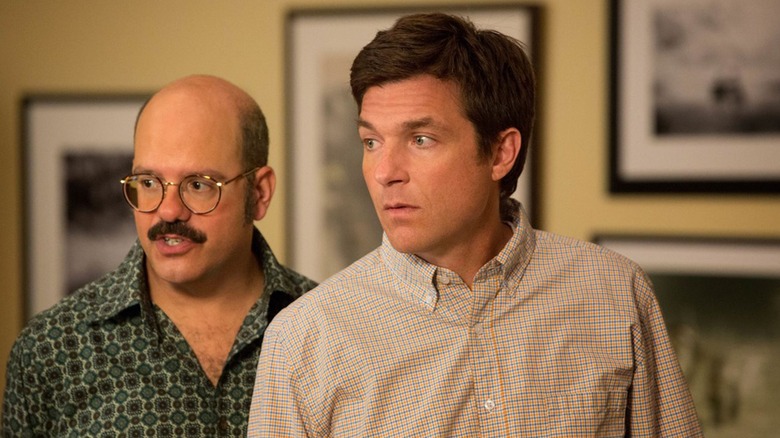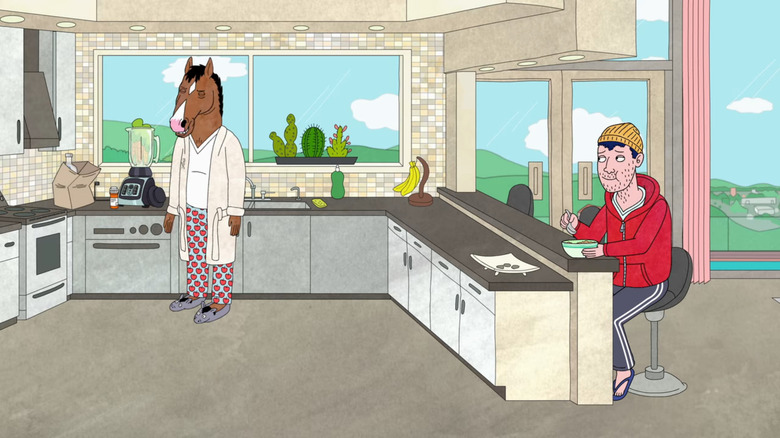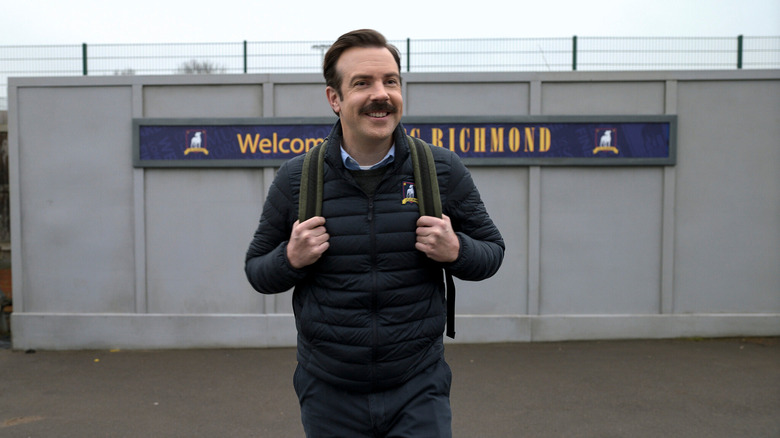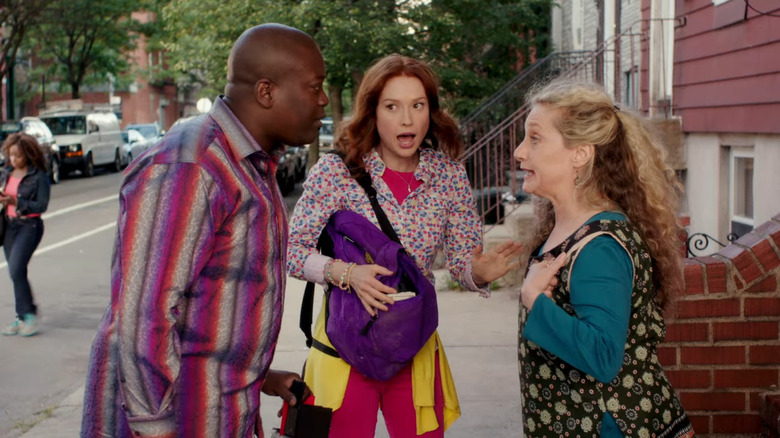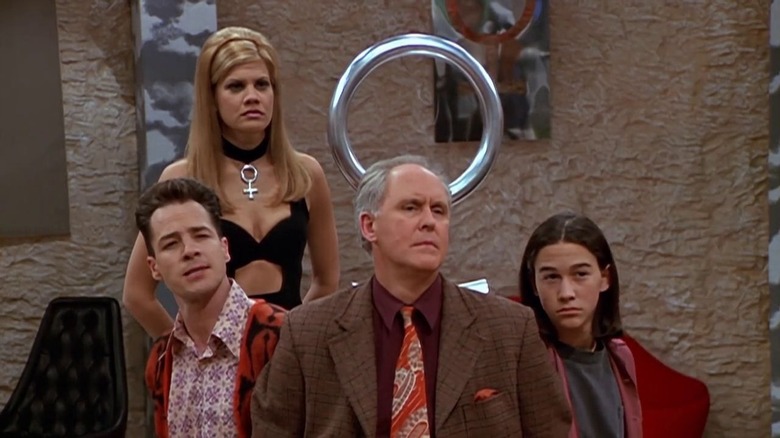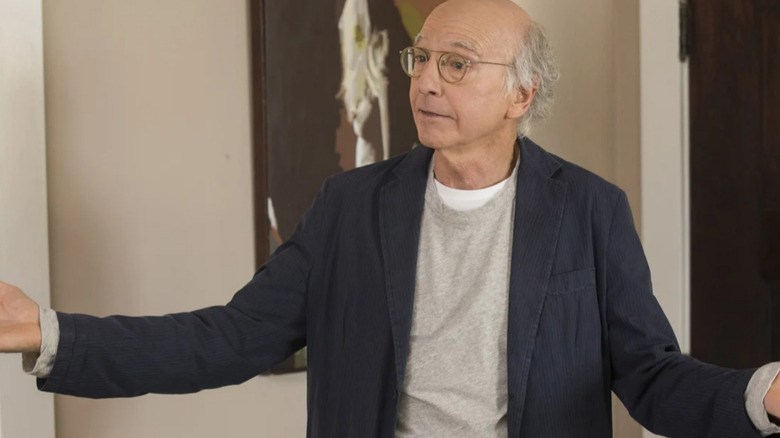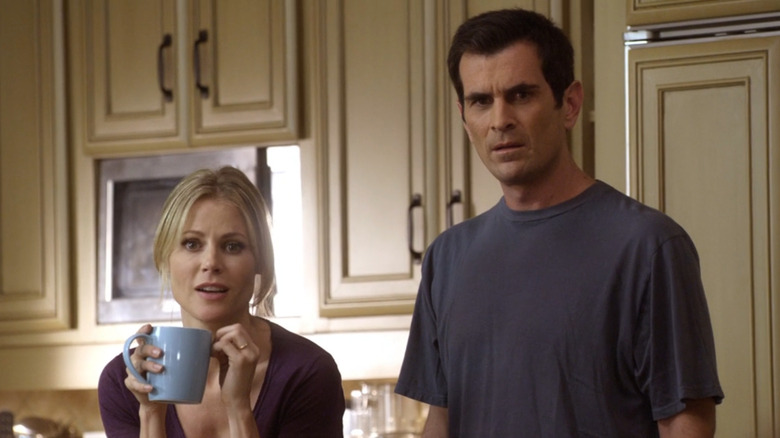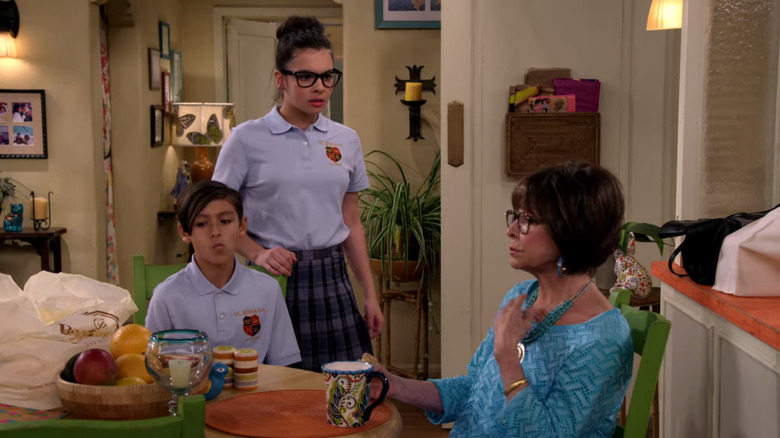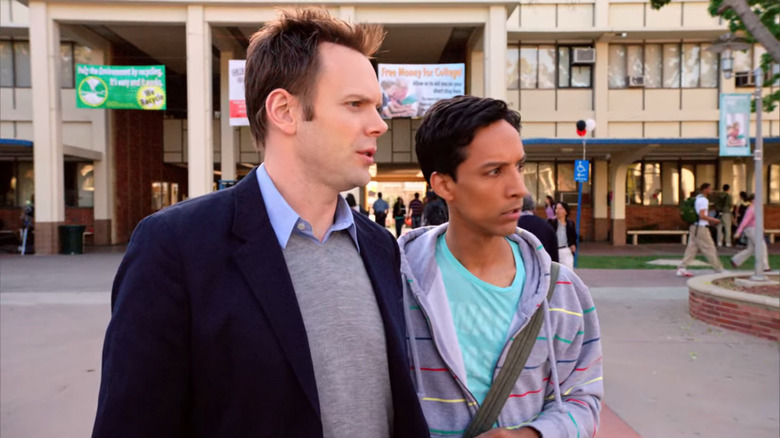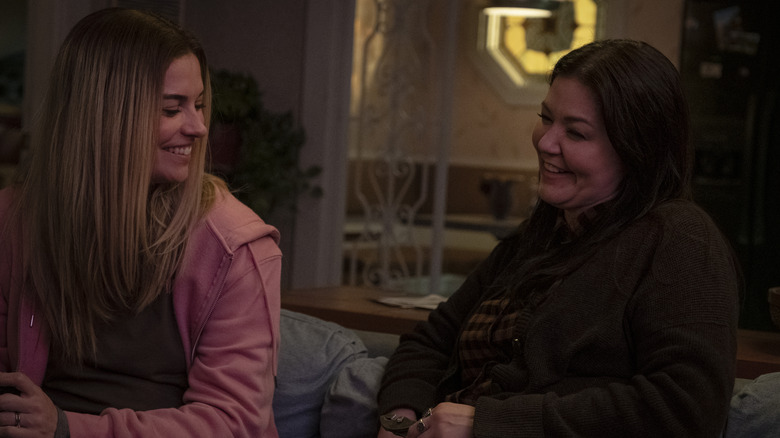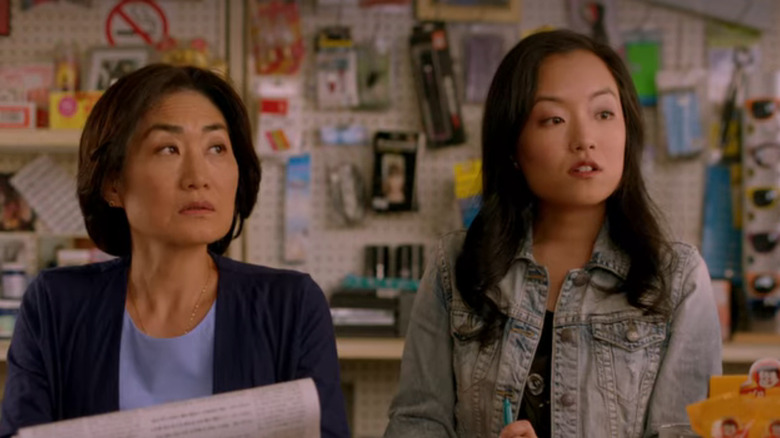12 Hilarious Shows Like Frasier That Fans Should Watch Next
Clocking in at 11 seasons and 264 episodes, "Frasier" is the rare spin-off that very nearly ran for as long as the original series, "Cheers," coming in at only nine episodes shy when it completed its run in 2004. With a recently-confirmed sequel apparently on the way from Paramount+, per Deadline, the story of "Frasier" may not have yet run its course. Following the exploits of a renowned pop psychologist as he starts afresh in the Seattle area with a brand new radio show with the aim of giving advice to call-in listeners, the spin-off kept Frasier's undeniably assuring demeanor and dropped him into a brand new world.
This show had big shoes to fill to create a solid substitute for "Cheers," a sitcom that GQ credits as one of the greatest in TV history. Introducing his producer Roz, his father Martin, his live-in aid Daphne, his brother Niles, and many more, "Frasier" used the necessary cast and scenery shift entirely to its benefit by delving into a new support system that quickly began to feel like a complete family despite its unconventional nature. A sequel nearly two decades down the line might indicate how much of a hole this series left in the lives of its fans. Fortunately, though the teasing but heartwarming family dynamic and the hilarious workplace drama may not have been fully replicated elsewhere, there are still plenty of shows that fans of "Frasier" might find equally enjoyable.
Arrested Development
Meet the Bluth family, a formerly wealthy group whose illegal activities finally catch up with them on account of the increasingly brazen white collar crimes of patriarch George. With wife Lucille and notably incompetent son Buster stepping in to take over the business, the surprisingly collected eldest child Michael is left to step in and navigate the mess the company is in. He's also tasked with the Herculean effort of bringing his intensely selfish and detached-from-reality siblings and parents together again to create a more loving home environment for his teen son George Michael. In the end, this may not exactly be what happens, but Michael and George Michael learn a lot from attempting to manage the unmanageable.
There is no doubt that the Crane family in "Frasier" loves each other dearly, but their teasing nature makes it clear that they know each other a little too well at times. That lightly dysfunctional dynamic is taken to its extreme in "Arrested Development," where Michael tries against all odds to corral his chaotic relatives into a functional unit as they all shoot off in their own strangely motivated directions regardless of his attempts. With a top-notch cast of comedians playing off of "straight man" Michael, "Arrested Development" can be surprisingly charming, with the good intentions of Michael and his son occasionally offsetting the more greed-driven and chaotic inclinations of his family.
BoJack Horseman
The star of a successful fictional '90s sitcom named "Horsin' Around" whose cancelation saw him typecast, fading rapidly into obscurity, and battling drug and alcohol addiction might not sound like the basis of a comedy, but "BoJack Horseman" made it work. Hilarious and sometimes even profound, the series sees Horseman attempting to make a comeback by releasing a memoir about his time on the show, which forces him to face many of the inner demons he's spent a lifetime trying to avoid. Flanked by a "Frasier" worthy supporting cast, Horseman spends much of the series navigating the demands of his agent, attempting to explain complicated person situations to his ghostwriter, and steering through the increasingly odd subplots of his roommate Todd.
Fans of "Frasier" will be familiar with depression played as a serious affliction through comedic means, as many characters on the series, from Frasier himself to Eddie the terrier, suffered bouts of depression at various points through the course of the series. Horseman begins the series very much mired in feelings of obsolescence, but the show doesn't put the full weight of that burden on his shoulders, showing how he has not only harmed others, but how Hollywood has a tendency to use creatives and spit them out. All this in mind, the series is at its best when Horseman has Frasier Crane style breakthroughs, making this a series that could have easily been on in the background in the Crane household.
Ted Lasso
When the owner of a fictional English soccer team called AFC Richmond hires an American football coach with little knowledge of soccer to mentor the athletes out of spite toward her ex-husband, the sports world reacts with deserved skepticism. However, the move backfires as this coach, Ted Lasso, appears full of optimism and ready to do the work to turn the team around. Over the course of two seasons, Ted Lasso doesn't just win people over, he offers enough helpful advice and support to put his team back on the map. With Rebecca's interest in the sport suddenly reinvigorated and Lasso on her side, the two work together even through their disappointments with a newfound resolve to take them to the top.
As the host of a radio show, it might go without saying that Frasier Crane is known for his meaningful dialogue and the ability to turn a phrase, but he would truly meet his match in Ted Lasso. Fluctuating from the utterly nonsensical to the deeply felt and profound, Lasso's one-liners, witticisms, and words of encouragement have given birth to seemingly endless memes and gifs across various social media channels for their ability to both resonate emotionally as well as make audiences smile. Things aren't always easy for Ted, and he even sometimes lets the people he cares about down, but that desire to stick with it and see things through to the end is a major part of what makes the series so beloved.
Unbreakable Kimmy Schmidt
After spending her life in a bunker with three other women and the leader of a doomsday cult controlling her day-to-day activities, "The Unbreakable Kimmy Schmidt" was finally freed one day, well after she'd entered adulthood. Realizing that the vast majority of her life had been based in paranoiac conspiracy theories and outright lies, Schmidt found herself at an impasse few of us would be able to fully understand. Choosing to move to New York and carve out her own path, she gets a job as a nanny and finds an offbeat support group in her aspiring actor roommate, good-intentioned landlord, and detached employer.
When Frasier made the move back to his hometown of Seattle, he found himself divorced and in a communal living situation, a complete changeup from how he'd been existing before. While not quite so extreme a change as that of Kimmy Schmidt, a big part of the series revolved around trying to make it work in an apartment with people that he loved but in the limited space of apartment life. Kimmy's story is about someone who was never allowed even a trace of autonomy who strikes out in a big move and finds an unlikely supporting cast that backs her up along the way regardless of their own individual eccentricities. We may never see a Kimmy-Frasier crossover, but it's safe to say these two could teach each other a lot.
3rd Rock From The Sun
With one of the more entertaining premises for a sitcom in TV history on lock, "3rd Rock From The Sun" follows the exploits of four crew members who land on Earth in hopes of better understanding what is considered a backwater planet by their species. A not-so-subtle play on the "Saturday Night Live" Coneheads skit and several sci-fi films and novels of the same vein, the series still became something uniquely its own over its six-season run. Taking on the generic names of Dick, Tom, Harry, and Sally, these extraterrestrials attempt to fit into everyday life in middle America. With their odd behavior and misunderstandings of humanity at the forefront, the show sees them ultimately making deep connections with many of the humans around them despite their objective to remain distant and observant.
Fans of the strained family unit in "Frasier" will find a lot to love in "3rd Rock From The Sun," but at its heart, there is a level of kooky fun that will serve as a good break from the dialed-in professional world of the Cranes. While the strength of the humor in "Frasier" often relies on deadpan delivery and unavoidable social awkwardness, "3rd Rock From The Sun" is fully of off-the-wall antics and bonkers performance choices. With Jane Curtain playing the "straight man" to a particularly-silly John Lithgow, the series delights in its own oddness, making it a gleeful jaunt through the oddities of human culture that stands the test of time.
Curb Your Enthusiasm
After "Seinfeld" drew to a close, co-creator Larry David's TV legacy was tied down in a way that most creators can only dream of. Choosing to double down on some of the wildest parts of "Seinfeld" through an even more adult-oriented, more autobiographical journey through his bizarre social encounters, David's follow-up was "Curb Your Enthusiasm." With the scenarios and outlines written by David and the dialogue mostly improvised by the top-of-their-game comedic actors that serve as supporting cast and guest stars, this is a show that could easily have not worked, but has gone on to cement its own place in TV history with a still-ongoing, 11 seasons so far, run.
Though not to the degree of "Curb," "Frasier" is known for taking awkward social situations to their extremes and leaving its characters struggling to free themselves of them without causing undue stress or harm along the way. In "Seinfeld," Jason Alexander's George was the stand-in for Larry David's comical social mishaps, while in "Curb," he flies fully off the rails into the obsessive, minutiae-driven rants and observations that made George such an iconic, if not always personally likable, character. One major strength of "Seinfeld" was never shying away from making the central cast come across as morally questionable people, and "Curb Your Enthusiasm" continues that vibe and then some. If you've ever had an encounter that left you wondering "AITA?" this is the show for you.
Modern Family
Shot in the style of a "mockumentary," "Modern Family" revolves around three different families of the modern era — one nuclear, one blended, and one same-sex. Showing how the problems each encounters tend to be very much the same, this series highlights the little things that bring us all together regardless of the circumstances of our lives. United by the patriarch Jay who remarries a much younger woman, the Colombian immigrant Gloria, in his later years, his children Claire and Mitchell have their own families to contend with. With Claire and her husband Phil making up the nuclear part of the story and Mitchell and his husband Cameron representing same-sex, the message of the series is that some things are truly universal.
Frasier may have been resistant to sharing an apartment with his dad and Daphne, but through mutual understanding and patience, they were able to make it work. The friendship between the Crane brothers and the genuine affection that tied them together while bringing in found family like Roz and Bulldog was a major part of what made the series click for a lot of viewers. Meanwhile, "Modern Family" has a similarly down-to-earth and loving vibe, though the backdrop is different and the children of each family play major roles in the series. Embracing unique family dynamics is a great thing for two series to have in common, making "Modern Family" a shoo-in for "Frasier" fans.
One Day At A Time
Based on the seminal 1975 sitcom of the same name, "One Day At A Time" reimagines the basic premise of a single mom raising her children alone as a Latino family in the modern age. Focusing on a Cuban-American family in the Echo Park neighborhood of LA, re-envisioning a classic sitcom allowed the series to delve deeper into issues like PTSD, sexism, racism, and xenophobia while garnering the same laughs and good vibes of the original run. Mother Penelope leaves the military and later her unstable husband Victor to build a new life with her two children Elena and Alex as well as her mother Lydia. Though circumstances aren't ideal, the family remains committed to one another, working through problems more serious than those usually tackled by sitcoms.
Though Frasier Crane doesn't have much in common with Penelope, their shared interest in healing from past traumas and learning from mistakes allows for a lot of thematic crossover in dealing with mental health issues. While Penelope's struggles to reconcile her time in the military and her divorce, she's also doing what she can to get back out there, and the first few seasons show her opening up to new experiences and reentering the dating world. Likewise, when her daughter comes out as a lesbian, the show tackles everything on the screen, leaving no room for ambiguity in its support for the LGBTQ+ community by continuing to introduce more queer characters throughout the run.
Fleabag
Based on Phoebe Waller-Bridge's one-woman show, "Fleabag" follows the story of an artistic but struggling woman in London, her life often in contrast to her relatively well-adjusted sister. Often breaking the fourth wall in classic one-woman-show style, "Fleabag" mixes a TV series with an intimate confessional between friends, making it one of the more unique TV offerings in recent years. Though it can be a bit agonizing to watch her make mistake after mistake, the commentary on isolation, loneliness, depression, and struggling through past mistakes and unstable friendships makes it a little more relatable than we'd like to admit at times.
Frasier Crane and Fleabag might not be particularly similar to one another on the surface, but they have a shared issue in being attracted to people that might not overall be the best for them in the long-term. The difficulties that Frasier had in the dating world are compounded and multiplied in "Fleabag," with the first episode alone showing a stream of ill-advised hook-ups and commiseration over a breakup. This leads to serious issues of guilt and depression as Fleabag seems more often than not mired in her mistakes to the point that she finds it difficult to move past them, but her sense of tenacity and, yes, even hope, at times, is what makes her inspirational even in her lowest moments.
Community
After lying about having a bachelor's degree, Jeff is disbarred from the law firm at which he works, which spurs him to pursue a legitimate degree by enrolling in a community college in Colorado. Immediately smitten with his classmate Britta, he attempts to form a study group as an excuse to get close to her. She immediately invites Abed, who then invites others, until the central group of Shirley, Annie, Troy, and Pierce forms. As most sitcoms require at least one character that seems to be completely detached from reality, Jeff and other members of the study group are often enlisted in the schemes of their dean, Craig.
Frasier Crane is no stranger to adjusting to disappointments and setbacks, nor is he unaccustomed to making the most out of a bad situation. As Jeff attempts to navigate a new world of personalities he might not have ever encountered if not for his enrollment at the college, he becomes genuinely fond of them. "Community" finds strength in a limited and sometimes insular backdrop, showing the way that local action and inaction can very much shape the world at large. Never minimizing the struggles of its characters regardless of how "small potatoes" the school might be played off as, the growing sense of, yes, community, becomes irresistible as the show books on through its six-season run.
Kevin Can F**k Himself
After the conclusion of the great "Schitt's Creek," cast member Annie Murphy dove into a devoutly meta deconstruction of classic sitcom tropes that allowed her to stretch her acting chops. Her character, Allison, is married to Kevin, a takeoff of the stereotypical "useless TV husband" in the vein of Homer Simpson or Doug Heffernan. While Kevin's world is a brightly lit, comical take on the world in which he never experiences direct consequences for his selfish behavior, Allison's world is much murkier, with muted colors and a significantly more somber tone as she tries to free herself from the manipulations of her husband.
While "Frasier" was about as far from one of those standard TV husbands as one can get, his friendship with his brother Niles played a huge role in helping him cope with life's various hardships. In "Kevin," Allison's support is her friend Patti, who urges her to do what's right for herself while showing endless acceptance and support. Ultimately, it is Patti who is there for Allison as she resorts to increasingly desperate means of freeing herself from Kevin, as well as when Allison realizes she's gone too far and attempts to pick up the pieces. That sense of comradery is what made "Kevin" as good as it was, focusing on the relationship between these two unlikely friends and allowing Kevin to be a footnote despite his insistence on taking the center stage.
Kim's Convenience
After studying to be a teacher in Korea, Mr. Sang-il Kim, or Appa, moved to Toronto to own and operate a neighborhood convenience store, titled, of course, "Kim's Convenience," with his wife, Mrs. Yong-mi Kim, or Umma. Though their eldest child Jung is estranged, their daughter, Janet, lives with them and studies art, much to her parents' dismay. A comedy that examines the traditionalism of Appa in contrast to Janet's more modern approach to life as well as the shop regulars that become well-known to the Kims, this five-season series managed to both poke fun at generational divides while showing the need for us to collectively reach across them.
One of the central conflicts of "Frasier" is the consistent misunderstandings between him and his father Martin, who is much older and more set in his ways, often insisting on a simplistic view of the world that doesn't always ring true for the modern day. The two are always able to overcome these issues through frank discussion and compassion, which is very much reflected by the central cast of "Kim's Convenience." Though estranged from Jung, the Kims are able to put their pride aside to reach out and try to create a better relationship. Likewise, though they don't always understand Janet, they make more attempts to reconcile with her interests as the series goes on, making for a heartwarming subplot to an otherwise hilarious show.
